|
Deus
Author: Sébastien Dujardin
Publisher: Pearl Games/Asmodee/Heidelberger Spieleverlag
Year: 2014
review by

| x |
|
|
|
|
|
|
|
|
|
|
|
|
|
|
|
|
|
|
|
|
|
|
|
|
|
|
|
|
|
|
|
|
|
|
|
|
|
|
|
|
|
|
|
|
|
|
|
|
|
|
|
|
|
|
|
|
|
|
|
|
|
|
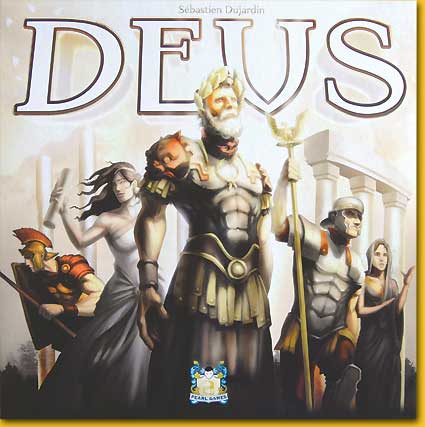 |
Everything has to serve a higher purpose, so we are not just playing cards and collecting points, let that be very clear right from the start. It’s actually all about temples, or at least the temples play a very significant role. But we’re not quite there yet.
On a world which size depends on the number of players, ships, production buildings, armies, science buildings and houses are built. Buildings are constructed by playing a card, and the player places the corresponding building next to one of his previously constructed buildings. |
|
|
|
| x |
|
|
|
|
|
|
|
|
|
|
|
|
|
|
|
|
|
|
|
|
|
|
|
|
|
|
|
|
|
|
|
|
|
|
|
|
|
|
|
|
|
|
|
|
|
|
|
|
|
|
|
|
|
|
|
|
|
|
|
|
|
|
| The very first building has to be placed at the edge of the world. The card is placed above a small player board, at the location corresponding to its category. The building costs are depicted on the card: usually one or two resources, sometimes also money. The card also shows its function: for example, score one victory point per building in a swamp, or sell or purchase resources. A temple always costs four different resources, and yields victory points at the end of the game if certain conditions are met, like two points for each area with two buildings on it, or three points for each building on a Wood tile. |
|
|
|
| x |
|
|
|
|
|
|
|
|
|
|
|
|
|
|
|
|
|
|
|
|
|
|
|
|
|
|
|
|
|
|
|
|
|
|
|
|
|
|
|
|
|
|
|
|
|
|
|
|
|
|
|
|
|
|
|
|
|
|
|
|
|
|
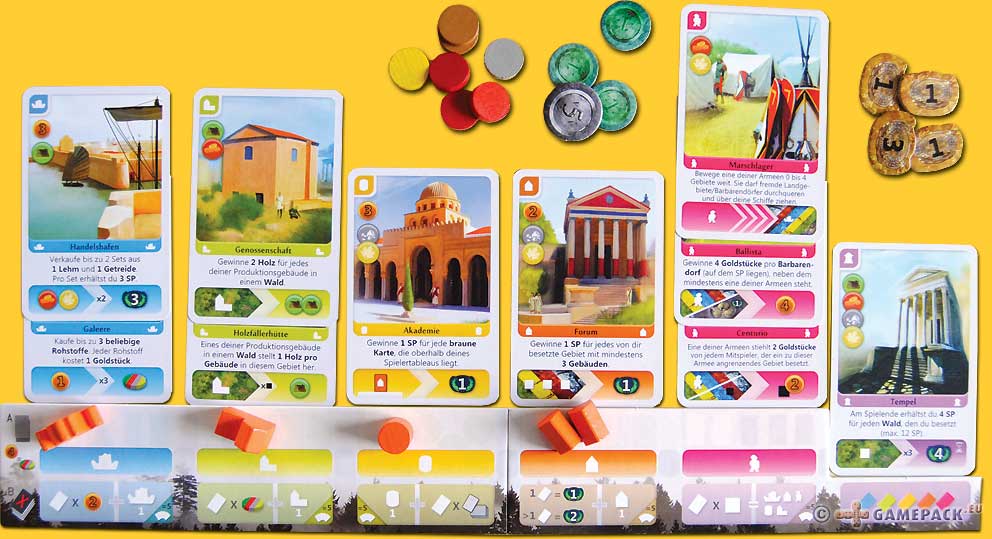 |
| x |
|
|
|
|
|
|
|
|
|
|
|
|
|
|
|
|
|
|
|
|
|
|
|
|
|
|
|
|
|
|
|
|
|
|
|
|
|
|
|
|
|
|
|
|
|
|
|
|
|
|
|
|
|
|
|
|
|
|
|
|
|
|
|
Points can also be earned by raiding barbarian villages. Each village contains three to six victory points, depending on the number of adjacent areas. These points can be claimed by completely surrounding the village. If at least one of the surrounding tiles contains an army, the village is defeated and the points go to the player with the most contributing armies. The surrounding buildings do not all have to be from the same player; it can be a mix of buildings of all colours.
|
|
|
|
| x |
|
|
|
|
|
|
|
|
|
|
|
|
|
|
|
|
|
|
|
|
|
|
|
|
|
|
|
|
|
|
|
|
|
|
|
|
|
|
|
|
|
|
|
|
|
|
|
|
|
|
|
|
|
|
|
|
|
|
|
|
|
|
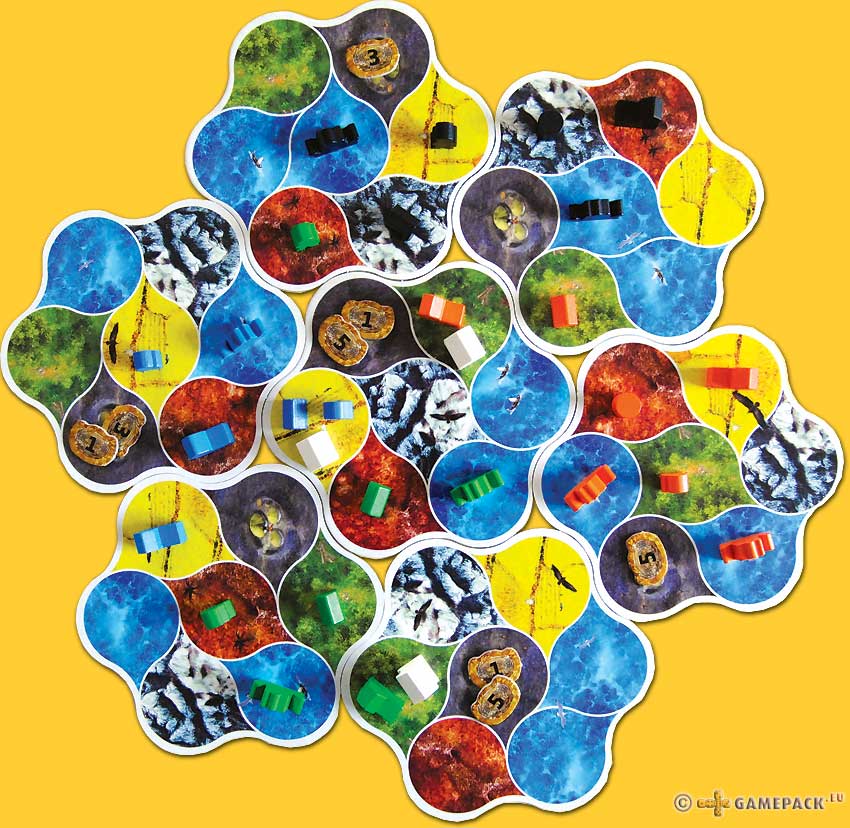 |
| x |
|
|
|
|
|
|
|
|
|
|
|
|
|
|
|
|
|
|
|
|
|
|
|
|
|
|
|
|
|
|
|
|
|
|
|
|
|
|
|
|
|
|
|
|
|
|
|
|
|
|
|
|
|
|
|
|
|
|
|
|
|
|
If a second card of the same category is played, the card is placed above the previous one, and then, how sweet: all the cards in this row are activated again! If you play your cards wisely this can lead to very profitable situations; card one: purchase resources for one coin. Card two: sell resources for four coins. Okay, it’s not yet victory points, but money is certainly very important too! For starters, if a player doesn’t have a required resource he can purchase it for four coins.
If a player runs out of cards, he may refill his hand to five cards. But alternatively he may choose to offer some of his cards to the Gods, which basically comes down to throwing them on the discard-pile, but anyway… The top card he offered determines what his reward for the offer will be. He always gets one building corresponding to the category of the top offered card, and something extra like money or resources or points, and then he refills to five cards. Players start with two buildings of each type, and offering is the way to put new buildings into play! |
|
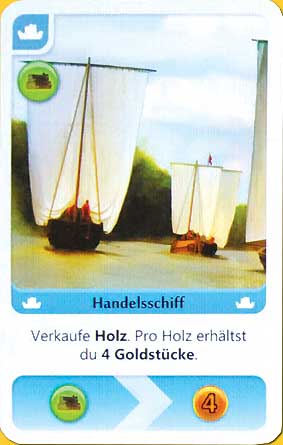 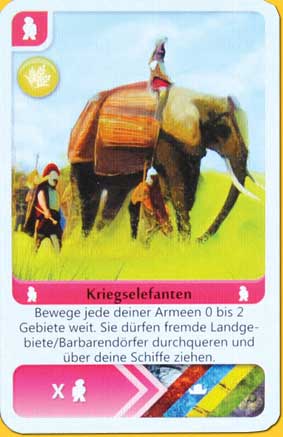 |
|
| x |
|
|
|
|
|
|
|
|
|
|
|
|
|
|
|
|
|
|
|
|
|
|
|
|
|
|
|
|
|
|
|
|
|
|
|
|
|
|
|
|
|
|
|
|
|
|
|
|
|
|
|
|
|
|
|
|
|
|
|
|
|
|
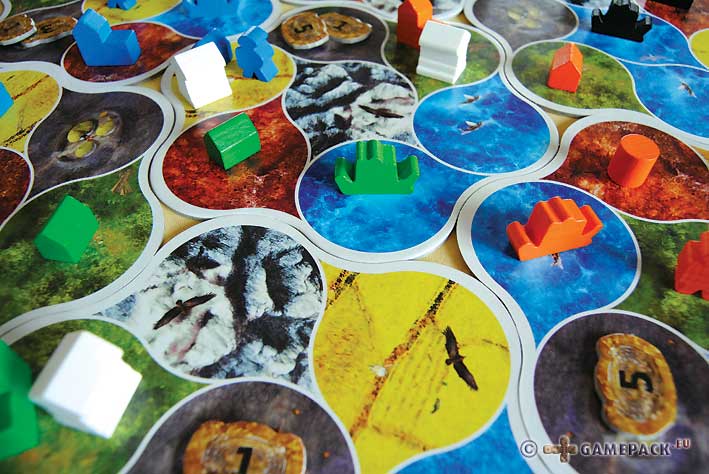 |
|
| xx |
|
|
|
|
|
|
|
|
|
|
|
|
|
|
|
|
|
|
|
|
|
|
|
|
|
|
|
|
|
|
|
|
|
|
|
|
|
|
|
|
|
|
|
|
|
|
|
|
|
|
|
|
|
|
|
|
|
|
|
|
|
|
A special ability of the armies is that they can move over the board, as opposed to all the other buildings. This way they can be moved to raid the next barbarian village, or to move to an area type that scores victory points at the end of the game according to the player’s temple. As soon as the last barbarian village has been overtaken, or the last temple has been built, the game is over.
A player’s success in this game largely depends on his cards. It can be very frustrating if one player can efficiently make use of his cards and collect resources an money by activating them, while another player desperately keeps throwing his cards onto the discard pile in the hope that he will finally draw something useful. |
|
|
|
| x |
|
|
|
|
|
|
|
|
|
|
|
|
|
|
|
|
|
|
|
|
|
|
|
|
|
|
|
|
|
|
|
|
|
|
|
|
|
|
|
|
|
|
|
|
|
|
|
|
|
|
|
|
|
|
|
|
|
|
|
|
|
|
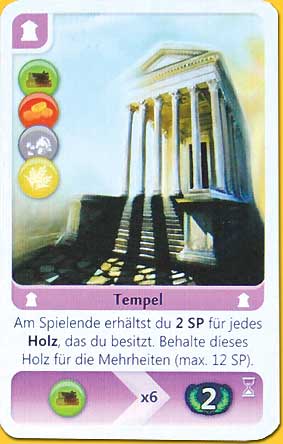 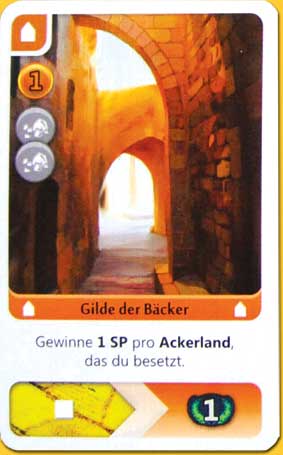 |
For example, without an army it is not possible to claim victory points from the barbarian villages. And since the armies can move, it is well possible that another player decides to drop by with his army and collect all the points. But that’s part of the game. Deus however is not very long or complex, and some luck-induced imperfections can therefore be easily accepted. The same element of luck comes into view with regard to the temple cards; some of the conditions are much harder to satisfy than others. The temple that scores points for every tile with three or more buildings on it is not a popular one; it often ends up being offered to the gods! |
|
|
| x |
|
|
|
|
|
|
|
|
|
|
|
|
|
|
|
|
|
|
|
|
|
|
|
|
|
|
|
|
|
|
|
|
|
|
|
|
|
|
|
|
|
|
|
|
|
|
|
|
|
|
|
|
|
|
|
|
|
|
|
|
|
|
Deus is a nice and smooth card-based development game. It’s all about drawing cards, and how to deal with the cards the Gods have blessed you with. Its relatively short playing time keeps Deus fresh and attractive; it has everything a game needs to become a classic!
© 2015 Richard van Vugt
Deus, Sébastien Dujardin, Pearl Games/Asmodee/Heidelberger Spieleverlag, 2014 - 2 to 4 players, 14 years and up, 60-90 minutes
|
|
|
|
  |
|
|
|
|
|
|
|
|
|
|
|
|
|
|
|
|
|
|
|
|
|
|
|
|
|
|
|
|
|
|
|
|
|
|
|
|
|
|
|
|
|
|
|
|
|
|
|
|
|
|
|
|
|
  |
|
  |
|
|
|
|
|
|
|
|
|
|
|
|
|
|
|
|
|
|
|
|
|
  |
|
|
|
|
|
|
|
|
|
|
|
|
|
|
|
|
|
|
|
|
|
|
|
|
|
|
|
|
|
|
|
|
|
|
|
|
|
|
|
|
|
|
|
|
|
|
|
|
|
|
|
|
|
  |
|
|
|
|
|
|
|
|
|
|
|
|
|
|
|
|
|
|
|
|
|
|
|
|
|
|
|
|
|
|
|
|
|
|
|
|
|
|
|
|
|
|
|
|
|
|
|
|
|
|
|
|
|
| x |
|
|
|
|
|
|
|
|
|
|
|
|
|
|
|
|
|
|
|
|
|
|
|
|
|
|
|
|
|
|
|
|
|
|
|
|
|
|
|
|
|
|
|
|
|
|
|
|
|
|
|
|
|
|
|
|
|
|
|
|
|
|
| x |
|
|
|
|
|
|
|
|
|
|
|
|
|
|
|
|
|
|
|
|
|
|
|
|
|
|
|
|
|
|
|
|
|
|
|
|
|
|
|
|
|
|
|
|
|
|
|
|
|
|
|
|
|
|
|
|
|
|
|
|
|
|
 |
|
|
|
|
|
|
|
|
|
|
|
|
|
|
|
|
|
|
|
|
|
|
|
|
|
|
|
|
|
|
|
|
|
|
|
|
|
|
|
|
|
|
|
|
|
|
|
|
|
|
|
|
|
 |
|
|
|
|
|
|
|
|
|
|
|
|
|
|
|
|
|
|
|
|
|
|
|
|
|
|
|
|
|
|
|
|
|
|
|
|
|
|
|
|
|
|
|
|
|
|
|
|
|
|
|
|
|
| x |
|
|
|
|
|
|
|
|
|
|
|
|
|
|
|
|
|
|
|
|
|
|
|
|
|
|
|
|
|
|
|
|
|
|
|
|
|
|
|
|
|
|
|
|
|
|
|
|
|
|
|
|
|
|
|
|
|
|
|
|
|
|
 |
|
|
|
|
|
|
|
|
|
|
|
|
|
|
|
|
|
|
|
|
|
|
|
|
|
|
|
|
|
|
|
|
|
|
|
|
|
|
|
|
|
|
|
 |
|
|
|
|
|
|
|
|
|
|
|
|
|
|
|
|
|
|
|
|
|
|
|
|
|
|
|
|
|
|
|
|
|
|
|
|
|
|
|
|
|
|
|
|
|